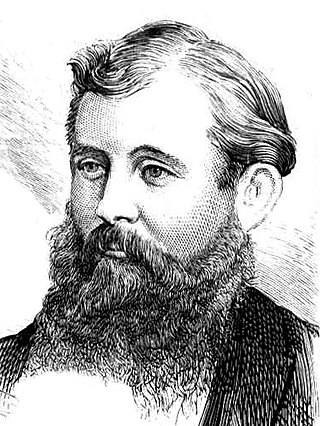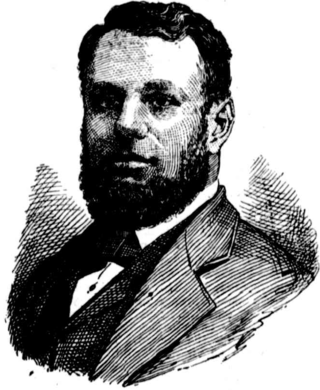Related Research Articles
Sherbrooke was an electoral district of the Legislative Assembly in the Australian colony of New South Wales, existing from 1894 until 1913. It included Blacktown and Baulkham Hills. It was named after Robert Lowe, 1st Viscount Sherbrooke.

John Stuart Hawthorne was an Australian politician.

John Fitzgerald Burns was an Australian politician, member of the Parliament of New South Wales, Postmaster-General in the 1870s and Colonial Treasurer in the 1880s.

Jacob Garrard was a politician in colonial New South Wales, serving as Secretary for Public Works and Minister of Public Instruction.
James Ebenezer Tonkin was an English-born Australian politician.
George McCredie was an Australian politician.

Andrew Hardie McCulloch was an Australian solicitor and politician.

William Consett Proctor was an English-born Australian solicitor and politician.
A by-election was held for the New South Wales Legislative Assembly electorate of Kiama on 13 January 1887 because of the resignation of Harman Tarrant, due to the pressures of his professional practice as a surgeon.
Bourke, an electoral district of the Legislative Assembly in the Australian state of New South Wales was created in 1880 and abolished in 1904.
Central Cumberland, an electoral district of the Legislative Assembly in the Australian state of New South Wales was created in 1859 and abolished in 1894.
A by-election was held for the New South Wales Legislative Assembly electorate of Central Cumberland on 17 December 1868 because of the resignation of Allan Macpherson, who left the colony to return to Europe.
A by-election was held for the New South Wales Legislative Assembly electorate of Central Cumberland on 14 March 1888 because of the resignation of Varney Parkes.
A by-election was held for the New South Wales Legislative Assembly electorate of Central Cumberland on 14 May 1888 because of the resignation of Andrew McCulloch who was facing financial difficulties. He announced his intention to recontest the seat at the by-election, even though he decided not to stand.
A by-election was held for the New South Wales Legislative Assembly electorate of Central Cumberland on 22 June 1889 because of the death of John Linsley.
A by-election was held for the New South Wales Legislative Assembly electorate of Central Cumberland on 28 September 1889 because of the resignation of Frank Farnell due to bankruptcy.
A by-election was held for the New South Wales Legislative Assembly electorate of Central Cumberland on 29 August 1891 because of the death of Robert Ritchie.
A by-election was held for the New South Wales Legislative Assembly electorate of Central Cumberland on 6 May 1893 because of the resignation of John Nobbs due to bankruptcy.
A by-election was held for the New South Wales Legislative Assembly electorate of Paddington on 12 January 1888 because William Trickett was appointed to the Legislative Council.
A by-election was held for the New South Wales Legislative Assembly electorate of Yass Plains on 8 February 1866 because Robert Isaacs had been appointed Solicitor General in the second Martin ministry. Such ministerial by-elections were usually uncontested however on this occasion a poll was required in Patrick's Plains and Yass Plains. Both ministers were comfortably re-elected with more than 70% of the vote. The other ministers James Martin, Henry Parkes (Kiama), James Byrnes (Parramatta) and Geoffrey Eagar were re-elected unopposed.
References
- ↑ A H McCulloch (15 December 1887). "To the electors of Central Cumberland". The Sydney Morning Herald . p. 1. Retrieved 25 August 2020– via Trove.
- 1 2 "Notice is hereby given that by an indenture of assignment". New South Wales Government Gazette . No. 725. 16 December 1887. p. 8344. Retrieved 8 May 2021– via Trove.
- ↑ "Mr Andrew Hardie McCulloch (junior)". Former members of the Parliament of New South Wales . Retrieved 12 April 2019.
- ↑ "Writ of election: Central Cumberland". New South Wales Government Gazette . No. 723. 14 December 1887. p. 8313. Retrieved 25 August 2020– via Trove.
- ↑ Green, Antony. "1887 Central Cumberland by-election". New South Wales Election Results 1856-2007. Parliament of New South Wales . Retrieved 25 August 2020.